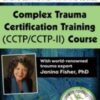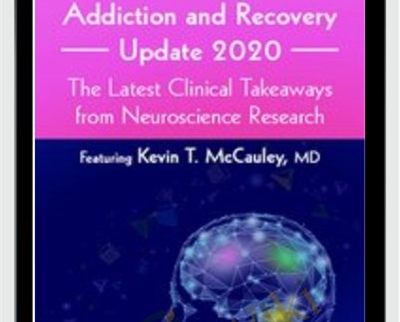$119.99 Original price was: $119.99.$44.00Current price is: $44.00.
Research in neuroscience provides an evidence-based and comprehensive understanding of addiction that fits well with the experiences of people needing, seeking, and in recovery. There are several insightful and well-articulated arguments challenging the disease conceptualization of addiction, but two important areas of research – epigenetics and psychoneuroimmunology – greatly advance awareness of how environmental stress creates vulnerability to addiction.
 Purchase this course you will earn 44 Points worth of $4.40
Purchase this course you will earn 44 Points worth of $4.40Research in neuroscience provides an evidence-based and comprehensive understanding of addiction that fits well with the experiences of people needing, seeking, and in recovery. There are several insightful and well-articulated arguments challenging the disease conceptualization of addiction, but two important areas of research – epigenetics and psychoneuroimmunology – greatly advance awareness of how environmental stress creates vulnerability to addiction.
This lecture reviews the most up-to-date science of addiction, the current arguments for and against addiction’s conceptualization as a disease, and how the principles of recovery management counter the pathophysiology of addiction and improve a recovering person’s chances of achieving long-term recovery.
- Appraise the latest neuroscientific explanations of substance use disorder pathophysiology and interpret Substance Use Disorder symptomology in light of this research.
- Investigate and analyze the arguments for and against the conceptualization of addiction as a brain disease.
- Analyze elements and evaluate examples of Recovery Management, post-treatment support/aftercare, and Recovery-Oriented Systems of Care.
- Utilize the principles of Safety Culture and Chronic Disease Management to solve common problems in early sobriety
I. Addiction: a disorder of reward learning, decision-making and self-awareness
- Definitions of Addiction
- The American Society of Addiction Medicine’s Definition of Addiction
- The DSM-5 Symptomology of Addiction (Substance Use Disorder)
- The Five Current, Leading Neuroscientific Explanations of Addiction
- Genetic Vulnerability (Blum)
- Incentive-Sensitization (Robinson and Berridge)
- Pathology of Memory and Learning (Kalivas)
- Stress-induced Allostasis (Koob and LeMoal)
- Pathology of Motivation and Choice (Volkow, Goldstein)
- The Debate about Addiction’s Definition as a Disease
II. Recent Advances in the Pathophysiology of Addiction
- Epigenetics: a new understanding of heritability of addiction & recovery
- The Overkalix Study and transgenerational trauma transmission
- Nicotine primes cocaine use (Kandel and Kandel)
- Psychoneuroimmunology: the Gut-Brain-Immune Loop
- Inflammation and Psychiatric Disorders
- The Role of Microglia in brain disease and repair
- Implications for the Disease Argument
III. Recovery Management: a Safety-based approach to sobriety
- Altering Health Disparities by Improving the Social Determinants of Health
- Professional Health Programs: What Makes a Good Aftercare Plan
- Treatment and “Recovery Literacy”
- Recovery Management Check-Ups
- Active Linkage to Recovery-Oriented System of Care (ROSC)
- Recovery Residences
- Peer-based Sobriety Support (Kelly, Kaskutas)
- Relapse Safety Planning
- Urine Drug Testing (Monitoring)
- Vocational Rehabilitation and The Collegiate Recovery Movement
- Addiction Medicine Specialists
- How Recovery Management informs Medication-Assisted Treatment
- “Hedonic Rehabilitation”
Get Addiction and Recovery Update 2020: The Latest Clinical Takeaways from Neuroscience Research – Kevin McCauley, Only Price $48
Tag: Addiction and Recovery Update 2020: The Latest Clinical Takeaways from Neuroscience Research – Kevin McCauley Review. Addiction and Recovery Update 2020: The Latest Clinical Takeaways from Neuroscience Research – Kevin McCauley download. Addiction and Recovery Update 2020: The Latest Clinical Takeaways from Neuroscience Research – Kevin McCauley discount.
Only logged in customers who have purchased this product may leave a review.
Related products
Uncategorized
= 85 Points
= 85 Points
= 125 Points
Uncategorized
Managing Patient Emergencies: Critical Care Skills Every Nurse Must Know – Dr. Paul Langlois
= 85 Points
= 65 Points
Uncategorized
Cognitive Rehabilitation Therapy: Practical Interventions and Personalized Planning – Jane Yakel
= 85 Points
Uncategorized
= 85 Points
Uncategorized
= 95 Points





Reviews
There are no reviews yet.